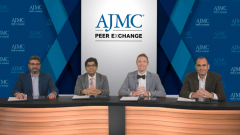
Key Considerations for Overall MDS Treatment Management
Key opinion leaders provide their final thoughts on treatment management for patients with MDS.
Episodes in this series

Ryan Haumschild, PharmD, MS, MBA: Thank you for this rich and informative discussion. Before we conclude, I’d like to get final thoughts from each of you. Dr Zeidan, I’ll start with you. What are your final thoughts around MDS [myelodysplastic syndrome] and the treatment of these patients?
Amer Zeidan, MBBS, MHS: The best way to improve care of patients with cancer in general but specifically MDS is going through clinical trials. Doctors should always think about a clinical trial for their patients. Hypomethylating agents have improved outcomes and quality of life for many patients, but the outcomes continue to be suboptimal overall. Most patients ultimately progress, and the survival benefit is lower in real life than in the clinical trial setting. Doctors and patients should always think: “What clinical trial can I go into?” This is how we move the field forward.
Ryan Haumschild, PharmD, MS, MBA: Discovery and innovation. I’m thankful that you’re a part of it. That’s huge. Dr Fazal, what are your final thoughts on the management of myelodysplastic syndrome?
Salman Fazal, MD: I certainly agree with enrolling patients in clinical trials. However, I’d also like to highlight that we have to individualize therapy for our patients with myelodysplastic syndrome. We have to take into account their comorbidities and the other problems that they’re experiencing. The other aspect that I’ll highlight is that multiple patients with myelodysplastic syndrome still aren’t getting treatment. Most of the patients with myelodysplastic syndrome are undertreated rather than overtreated. That’s my advice for the people who are listening.
Ryan Haumschild, PharmD, MS, MBA: Yes, make sure we’re getting good screening. How do we leverage in that precision medicine piece and treat the whole patient with quality of life? Dr Weaver, I’m going to leave the last comments for you. You’re our resident payer [on this panel] and a clinician, and you’ve given us a lot of good things to think about regarding the management of the disease. What are your final thoughts?
Jay Weaver, PharmD, MPH: Always try to keep health care more affordable, whether it’s through premiums or co-payments for different services. As we look at treatments in this space, and we see how they’re brought to market, it will be critical to keep an eye on the value they’re bringing as well as the evidence generated in clinical trials or phase 4 studies. We’ve had an unprecedented number of therapies in the oncology space over the last several years that have proven to be not as valuable as we hoped and have been pulled back or had their recommendation reframed. As we continue to innovate in this space, keeping our eye on the evidence will be even more important, from not only a financial standpoint but also a patient care standpoint, to make sure we’re arming people with the best therapies that will hopefully prolong their life.
Ryan Haumschild, PharmD, MS, MBA: Appropriate management of care is so important to total cost of care when we look at these patients. Well said. Thank you all, and thank you to our viewing audience. We hope you found this AJMC® Peer Exchange to be useful and informative.
Transcript edited for clarity.
Newsletter
Stay ahead of policy, cost, and value—subscribe to AJMC for expert insights at the intersection of clinical care and health economics.









